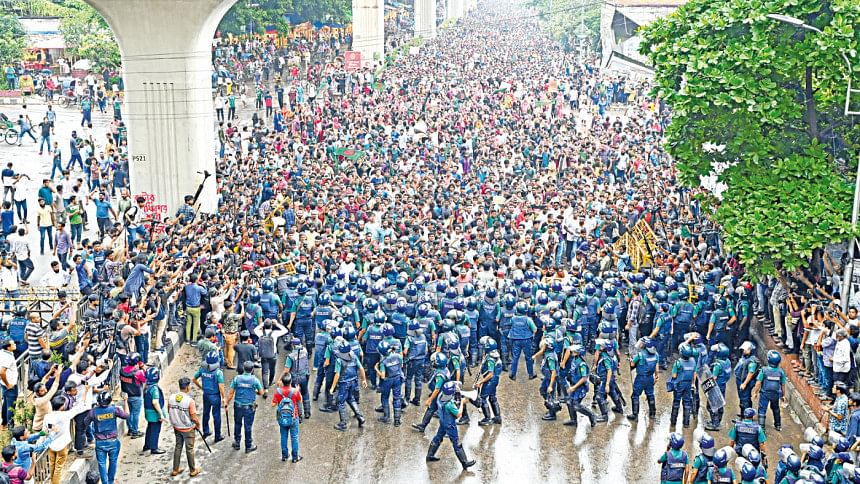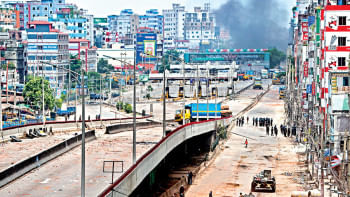Job-scarce economy

The recent unrest stemming from a student movement seeking reforms to the quota policy for government jobs boiled over into violence after the initially peaceful protest was allegedly attacked by an opposing party.
Then, between July 18 and 25, there was an internet outage and the government imposed a nationwide curfew in a bid to restore order. People were understandably anxious at the time as they were cut off from almost all communication and had no idea what may come next.
And although things have slowly improved since then, seeing the lengths people would go to for a better chance at working in civil services begs the question: what is so appealing about government jobs?
Ahmed Reza (not his real name), a former student of economics at Jahangirnagar University, first appeared at the Bangladesh Civil Service (BCS) examination in 2017.
He has taken the exam five times since, and reached the viva voce twice, but on all occasions he failed to secure a coveted government job.
He was assigned a non-cadre post in the 40th BCS, but didn't join as he had greater aspirations.
Despite the failures, he didn't go for any private sector job either.
Instead, he took a different exam and joined a government office as an 11th-grade official. He was posted in Chapainawabganj, a northwestern district. But he continued to strive in future BCS exams.
"The private sector is full of uncertainties. Layoffs can happen at any time without due reason," Reza explained over the phone.
He also pointed to a lack of benefits like pensions and a lower perceived social status for his disinterest in the private sector.
Thousands of Bangladeshis like Reza graduate from universities every year and many opt to sit for the BCS exams to ensure a decent living.
This is despite the private sector being the engine of the economy, growing by 6 percent on average since 2000.
However, university graduates do not prefer the private sector unless they can find jobs in banks or multinational companies.
Factors like low salaries, a lack of job security, high workloads and a lack of post-retirement benefits are to blame for the indifference, according to an analyst.
Except for public service and a few private companies, job security is scarce in Bangladesh. Only a few private companies comply with the labour law.
Despite this, a large number of educated candidates have no choice but to turn to the private sector. But there are simply not enough jobs, which is reflected in the high unemployment rate among people with tertiary education.
Among graduates, 28 percent were unemployed in 2022, estimated to be around 8 lakh of the total unemployed population, according to the Labour Force Survey 2022 by the Bangladesh Bureau of Statistics (BBS).
Graduates also remain unemployed for a long time, as nearly 20 percent wait for two years for a job, while 15 percent remain jobless for more than two years, as per the BBS data.
Against this backdrop, university students demanded the government reform the quota system for public sector jobs.
"The high unemployment rate and a dearth of jobs have led to the quota reform movement," opined Syed Sultan Uddin Ahmmed, former executive director of the Bangladesh Institute of Labour Studies.
The quota system reserved 56 percent of total jobs for children and grandchildren of freedom fighters, women, ethnic minorities and persons with disability, specifically for the 9th to 13th grade, as of 2018.
The remaining jobs were filled based on merit.
In the wake of massive student protests in 2018, the government reformed the quota system.
However, following a writ petition, the High Court reversed that decision in June this year.
This led to the reinstatement of the quota system and students once again took to the streets to protest the decision.
Eventually, the peaceful movement turned violent, leading to the death of at least 204 people, many of whom were students.
However, the Supreme Court upheld the order to reform the quota system on July 21, increasing the merit-based recruitment in civil service to 93 percent.
Shortly after, the government issued a circular, saying only 7 percent would secure jobs through various quotas.
"Private jobs paid around three times more than public jobs. But when the government announced a higher pay scale in 2015, it reduced the gap significantly. So public jobs became more popular," said SM Zulfiqar Ali, research director at the Bangladesh Institute of Development Studies (BIDS).
He attributed other factors like pensions, fiscal benefits, and the feeling of power that government jobs provide for their popularity.
As the unemployment rate among graduates has increased over the years, most private companies can get away with offering low pay.
Ali alleged that the high unemployment rate among graduates enables the private sector to exploit them and offer low salaries.
The lack of interest for private sector job among graduates was evident from their participation in the BCS examination as around 4.75 lakh applications were registered for the preliminary examination of the 41st BCS and 4.35 lakh for the 43rd BCS.
However, competition is fierce.
For example, after the 43rd BCS, the Bangladesh Public Service Commission recommended 2,805 candidates for different cadre and non-cadre positions.
"Except for public service and a few private companies, job security is scarce in Bangladesh. Only a few private companies comply with the labour law," Ahmmed added.
He further said the starting salary for most private jobs is Tk 20,000 to Tk 25,000, while their cohorts in government jobs get almost double alongside other benefits.
"There is deep-rooted discrimination in terms of social dignity and job security and that's why the recent protest was not confined to quota reform -- it was also for raising the voice of many unemployed graduates," said Ahmmed.
As per the BBS, the unemployment rate in Bangladesh was 3.5 percent in 2022, which he said was due to a faulty definition.
According to the definition, a person is considered employed if he or she works for even a single hour during the previous week.
Ahmmed and Ali both believed that this definition simply did not work from Bangladesh's perspective.
"If we take into consideration the Bangladesh's perspective, the unemployment rate among graduates as well as the overall jobless rate might be higher," he said.
Employment includes part-time, informal, temporary, seasonal or casual jobs within the national territory or abroad.
At present, the country has nearly 26 lakh unemployed people, with 21.46 lakh or almost 83 percent aged between 15 to 29.
Additionally, around 68 lakh people are underutilised and are suffering from underemployment. Of them, 13.18 lakh are graduates.
Sayema Haque Bidisha, a professor of economics at the University of Dhaka, believes that high unemployment has created frustration and anger among graduates.
"Graduates are more interested in public jobs for job security and social status," she said.
Besides, not all graduates have the necessary skills for private jobs. This skill mismatch leads many to go for government jobs, exposing the lack of upskilling support, she added.
"We need to develop our academic curriculum and provide soft skills to the graduates as per the job sectors' requirements."
Sabuj Sarker, who graduated in mass communication and journalism from Rajshahi University in 2019 and is currently preparing for public jobs, said some private firms offer higher perks and benefits than public jobs, but most of them are Dhaka-based.
Khondaker Golam Moazzem, research director of the Centre for Policy Dialogue (CPD), said there are 12 lakh government employees in Bangladesh.
He added that the majority of employment is in the private sector. So, jobs for graduates haven't increased alongside demand.
"Our job structure is shaped like the Eiffel Tower. We have available jobs for low-skilled and less educated persons. But we do not have enough managerial or white-collar jobs, which is why many educated young people leave the country," he said.
"In such a situation, frustration grows when a graduate sees that the scope to get a job in the public sector is reduced," Moazzem added.
However, he opined that unemployment among graduates would not be solved by reforming the quota.
"If you want to solve the problem of unemployment, the private sector has to play an important role."

 For all latest news, follow The Daily Star's Google News channel.
For all latest news, follow The Daily Star's Google News channel. 









Comments